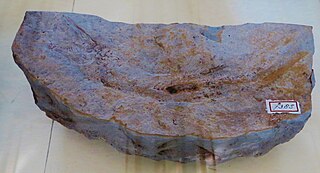
Echidnocephalus is an extinct genus of prehistoric halosaur known from the Late Cretaceous. It is the earliest known definitive member of the order Notacanthiformes.
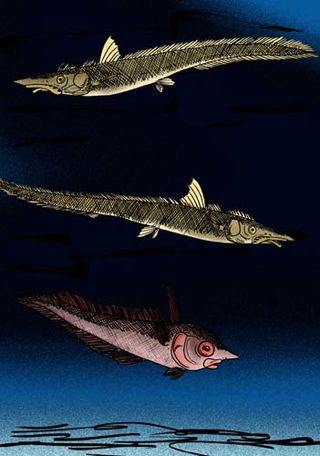
Laytonia is an extinct genus of prehistoric halosaur that lived in deep water off the North American Pacific Coast from the Zemorrian Epoch until during the Upper Miocene subepoch, when tectonic uplift effectively destroyed the genus' habitat by making the deep water too shallow.
Xyne is an extinct genus of prehistoric herring that lived during the Upper Miocene subepoch. Fossils are known from the Dicalite Quarry and Diatom Hill in California.

Bolbocara is an extinct genus of rattail that lived during the Upper Miocene subepoch of Southern California. It contains a single species, B. gyrinus. It may be related to the extant genus Bathygadus.
Paracalamus is an extinct genus of prehistoric bony fish that lived during the Upper Miocene subepoch.
Tunita is an extinct genus of prehistoric mackerel that lived during the Upper Miocene subepoch of Southern California.
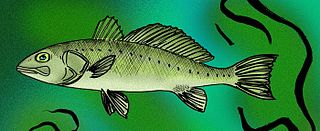
Lompoquia retropes is an extinct genus of ray-finned fishes belonging to the family Sciaenidae, the drums. These fishes lived what is now Southern California during the Upper Miocene subepoch.
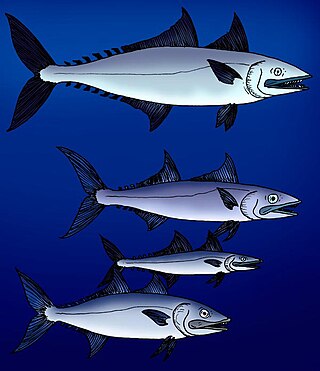
Thyrsocles is an extinct genus of prehistoric bony fish that lived during the Upper Miocene subepoch.
Eriquius is an extinct genus of prehistoric bony fish that lived during the Upper Miocene subepoch.
Ocystias is an extinct genus of prehistoric bony fish that lived during the Upper Miocene subepoch.

Chalcidichthys is an extinct genus of prehistoric manefish. It contains a single species, C. malacapterygius, that lived during the Upper Miocene of Southern California. It is known from the Modelo Formation in Los Angeles County, and specimens were found during construction of a tunnel on Sepulveda Boulevard. It is assumed to have preyed on siphonophores, like its living relatives.
Pseudoseriola is an extinct genus of prehistoric bony fish that lived during the Upper Miocene subepoch.
Protanthias is an extinct genus of prehistoric bony fish that lived during the Upper Miocene subepoch.
Achrestogrammus is an extinct genus of prehistoric Scorpaeniformes fish that lived during the Upper Miocene subepoch of California.
Evesthes is an extinct genus of prehistoric bony fish that lived during the Upper Miocene subepoch.
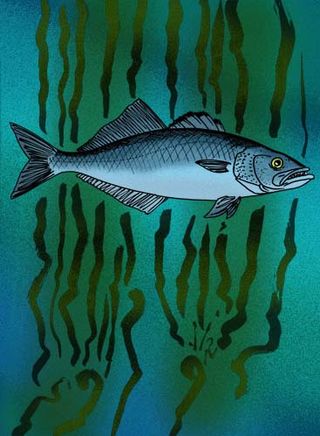
Lophar miocaenus is an extinct bony fish almost identical in form to the living bluefish, Pomatomus saltatrix, differing in its dentition, which consisted of "thick, conical subequal teeth" instead of the sharp, slender teeth and canines seen in bluefish. L. miocaenus lived during the Upper Miocene subepoch of Southern California.
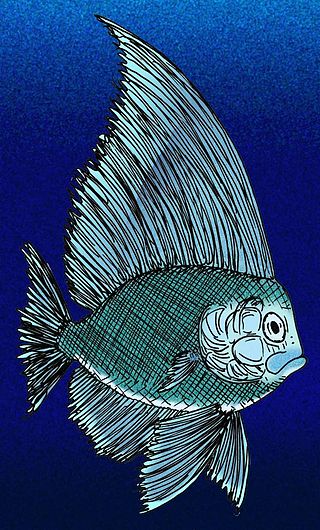
Absalomichthys velifer is an extinct, prehistoric manefish that lived during the Upper Miocene of what is now Southern California in the United States. Its dorsal fin was huge in comparison with living species. It is known from the Modelo Formation of Los Angeles County.
Pirskenius is an extinct genus of prehistoric bony fish that lived during the early part of the Miocene epoch.
Bregmacerina is an extinct genus of prehistoric marine ray-finned fish, most likely a codlet, that lived during the early part of the Miocene epoch. It contains a single species, B. antiqua, from the Burdigalian Sakaraul Horizon Formation of North Caucasus, Russia.

Palaeogadus is an extinct genus of prehistoric bony fish. It was a nektonic carnivore found in coastal and estuarine marine environments, with fossils found from the Oligocene to Miocene at sites in Denmark, Germany, Poland, Georgia, and Azerbaijan.








